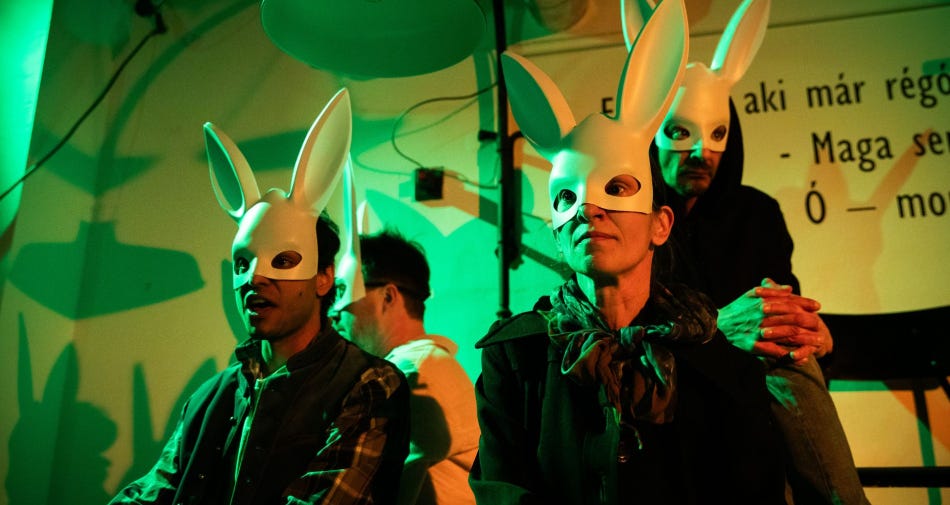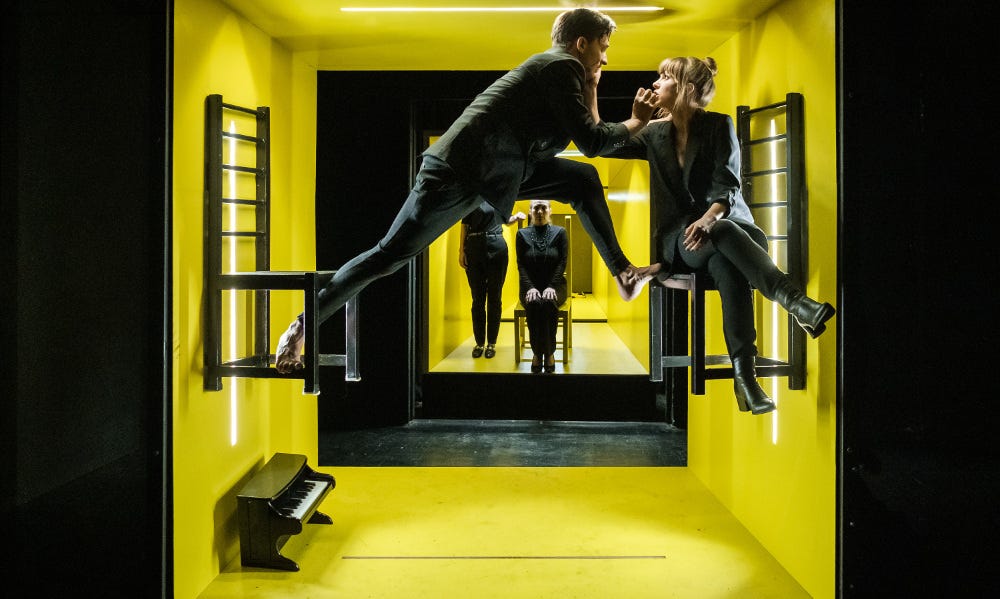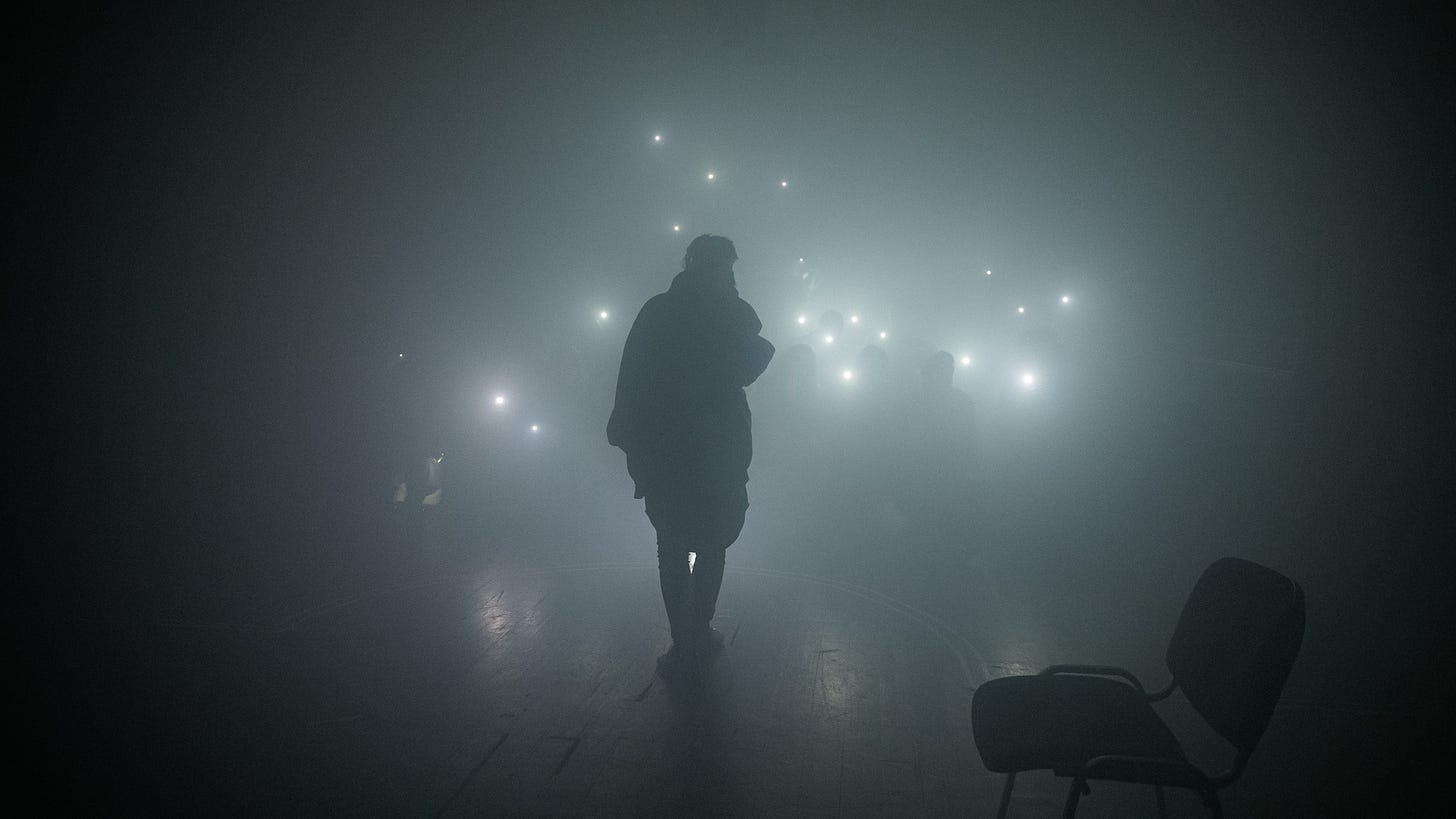The devil's ceilidh: The Strange Undoing of Prudencia Hart in Hungary
On a playful Hungarian production of David Greig's witty verse play.
As I mentioned last week, Exeunt, the independent theatre magazine, has been revived from its extended slumber and is now arriving in in-boxes twice weekly. This recent piece on Robert Icke and Greek tragedy is a great taster of what you can expect.
I also have a couple of podcasts to recommend. The recently launched and self-explanatorily-titled London Theatre Review, in which Nancy Durrant (of the London Culture Edit) and Nicks Curtis and Clark discuss the week’s new openings in London, and Fergus Morgan’s equally self-explanatory A History of Scottish Theatre in Six Plays. Both are well worth a listen.
If you enjoy reading this newsletter, please share with others or consider becoming a free or paid subscriber. Café Europa is free to read and I’m keen to keep it that way. Your support really helps.
One of my favourite books as a child was a beautifully illustrated volume of Slavic folk tales. The devil featured prominently in its pages. He was always popping up, to set traps and hoodwink the unwary. The devil was cunning but he wasn’t infallible and I found it reassuring that, if you were smart, the devil could be bested.
The devil puts in a memorable appearance in David Greig’s play The Strange Undoing of Prudencia Hart, which he co-created with director Wils Wilson for the National Theatre of Scotland in 2011, a production that was made to be performed in pubs rather than theatres. That’s when I first saw it, at the Ghillie Dhu, an atmospheric bar in a converted church in Edinburgh, with a cast of actor-musicians who nimbly wound their way among - and occasionally leapt on top of - the tables.
Dániel D Kovács’s production for the independent Hungarian company Studio K generates a similarly immersive energy. A pair of bunnies beckon us into the building, where instead of going into the auditorium, we’re offered a drink at the bar and invited to sit on at mixture of bench seating and cabaret style tables arranged in the theatre lobby. The music is thumping as we take our seats. There’s a small stage in the corner for a band and the actors use the whole of the space to bring the story to life.
Prudencia (played with nervy warmth by Melitta Pallagi) is a reserved academic, specialising in border ballads and the topography of the underworld. She has a deep love of folklore and a distrust of trendy academic approaches, particularly those favoured by the uncouth Colin Syme. At a conference in the Scottish border town of Kelso, Prudencia find herself overwhelmed by social awkwardness when confronted with more confident colleagues. Marooned because of the worsening weather, she winds up at a folk music night at a local boozer, before fleeing into the snowy night and finding herself at the mercy of a devilishly charismatic B&B owner.
The production was being presented as part of Desiré Central Station, a regional theatre festival in Subotica, a city in the north of Serbia. The festival owes its unusual name to Subotica’s proximity to the Hungarian border. (Desiré was the nickname of the city’s most famous writer, Dezső Kosztolányi). It’s a bilingual city, which is reflected in the festival programming, which features a mix of Hungarian and Serbian work as well as work from the wider region. It was in many ways the perfect location for a production of this particular play, in which a small town in the Scottish borders becomes a membrane between realms.
The original production, with its drams of whisky, finger sandwiches and snowstorms made of ripped-up paper napkins, was an absolute delight, part ceilidh, part play. It was witty and wordy and magical and I bloody loved it, so much so that I went to see it a second time, later on its tour at the student union bar in Norwich. That production went on to tour extensively, including a stint in New York before being revived in 2018. Seeing a more conventionally staged version of the play at Manchester’s in-the-round Royal Exchange Theatre in 2021, while charming, only underlined how delicious the original was.
One of the joys of Greig’s text is that it is written partially in verse, mimicking the ballad form, but while people who speak Hungarian informed me that the translation is excellent – the translation even won a special award from the Theatre Critics Guild in Hungary – obviously this was entirely lost on me. Instead of surtitles non-Hungarian speakers were provided with simultaneous translations, which while admirably well done was always slightly out sync with the actors. It’s a credit to the performance that it was still immensely enjoyable and, despite the language barrier, remarkably close in spirit to the original.
Prudencia finds herself stranded in hell for millennia with a louche but terminally bored devil and the underworld’s best-stocked library for company. As time passes, she undergoes a process of both awakening and letting go.
Kovács’ production contains some inspired touches. The scene in the original in which Prudencia encounters a quartet of women out on the razz is arguably its weakest part, but here, the cast don rabbit masks and Prudencia finds herself surrounded by coked-up, juddering bunnies in a scene that is as funny as it is disconcerting. Later, when Prudencia descends to hell we use our phone torches to light the way into the darkened theatre auditorium. Then, when she first sets eyes on the library, the curtain raises and the stage is flooded with light. Prudencia may be in hell, but in this moment she is in heaven.
I was intrigued by why this very Scottish play came to be performed by an independent Hungarian theatre company, so I asked the director. While Studio K had a reputation for producing experimental work, in recent years it has mostly programmed work based on classical dramas, he explained. I first encountered Studio K’s work at Desiré Central Station in 2022, with a gripping and highly stylish production about the life of the emperor Nero, directed by Máté Hegymegi, in which the young emperor was played as a brattish and swaggering proto rock-star prone to whipping off his trousers. With its bold yellow and black set design, it was slicker and sharper than many productions I’ve seen at theatres with far greater resources. I mean, look at this:
Kovács was looking to do something different, to give the troupe something new to work with. Although post-dramatic theatre was an influence and inspiration on his work, “I strongly believe in the power of storytelling,” he told me. At the same time, he often encountered a suspicion towards conventional storytelling among some of the students at the university where he teaches.
Intrigued by this tension, he fed all of his thinking into ChatGPT one day and asked it for suggestions for lesser- known texts he could perform. While the algorithm suggested a few made-up titles, it also threw up a few gems, including David Greig's play, which with its mix of classical storytelling and exploration of the relationship between the traditional and the post-modern was right up his alley. Kovács’ previous collaborator, the poet, musician and dramatist, Peter Zavada, set about translating the text while retaining its ballad form and rhyme structure, as well as its playful, contemporary feel.
While Studio K theatre's home venue in Budapest is pretty dinky, capable of seating around 65 people, they decided to use the lobby space and theatre bar to perform the play, which has more of a pub-like vibe.
(A digression on Hungarian applause. While different countries have different curtain call traditions, I am always fascinated by the way Hungarian audiences clap. Instead of the applause building in an organic way, people clap in unison with the speed gradually increasing only to suddenly and abruptly slow down again and the process to be repeated, in a series of waves. The first time I experienced it, my impulse was to resist falling into the rhythm but it’s actually quite difficult to do!)
Like many independent companies in Hungary, the company is struggling financially. While Hungary spends lavishly on culture – it hosted the Theatre Olympics in 2023 – the independent sector is increasingly squeezed (you can read more about the challenges facing the Hungarian independent scene in this SEEstage article). Like many small companies, Studio K relies more and more on the income generated by selling tickets, while still trying to keep its prices low so that the work remains accessible to more than just a wealthy few. As a result, Kovács explains, this leads to smaller troupes (and even some bigger, state funded theatres) choosing what he calls “sure-shot plays,” and generally leaving less space for experimentation.
While Prudencia Hart is a not exactly a risk - it’s playful, funny and sexy and ends with arguably the best pun in contemporary British theatre – nor is it the most obvious choice for a small Hungarian theatre to perform. And yet it works. It lands. While there’s no direct equivalent to a ceilidh in Hungary, for an older generation of Hungarians with memories of socialism, Kovács explained, the folk movement is associated with “gatherings with counter- cultural undertones.”
The production also benefits from two superb performances from Melitta Pallagi as Prudencia and Gábor Nagypál, as Nick. Wearing double-denim and a baggy leather jacket, Pallagi plays Prudencia not as prim and brittle, but someone who struggles in social situations and has a visceral terror of public speaking; Nagypál is good at silently smouldering and Kovács’ production ramps up the physical connection between them, and in the second half of the production, Prudencia seduces him, their bodies intertwining on the long table that has been placed at the centre of the performance space, their hands exploring each other’s bodies as clothing is hastily discarded.
I was less enamoured with the fact that Prudencia’s escape from the underworld essentially turns into a tug-of-war between the laddish Colin Syme - played with vigour by Daniel Lovas - and the possessive devil, with her caught in the middle of two men. This dilutes her sense of agency and it makes it feel much more like she is straight-up being rescued.
While some later scenes were very Colin-centric in a way that threatened to unbalance things for me, the production really brings things round in the closing moments with Pallagi performing a haunting, slowed-down version Kylie’s ‘I Can’t Get You Out of My Head.’ The deployment of Kylie was more of a cheeky wink in the original, but here it’s ambivalent and melancholy and suggests that Prudencia will never truly be free of her devil.
I suppose I should not have been surprised that Greig’s play would work so well in another setting. As the play so ably demonstrates, the ballad form is malleable and longing is borderless.
This week in European theatre
A round-up of festivals, premieres and other upcoming events over the next seven days
Changes - Thomas Ostermeier directs the new play by Maja Zade, in which Anna Schudt and Jörg Hartmann return to the Schaubühne ensemble to play long-married couple Nina and Mark, a member of parliament and a businessman-turned-school teacher. The world premiere takes place at the Schaubühne on 30th November.
Louise – Swiss choreographer, director and performer Martin Zimmermann presents his new wordless fusion of theatre, dance and circus at the Schauspielhaus Zurich. It opens on 30th November.
Legend - Kirill Serebrennikov returns to the Thalia Theater for a new piece drawing on the work of the legendary Armenian filmmaker Sergei Parajanov, the director of the gorgeous The Colour of Pomegranates. A coproduction with Ruhrtriennale 2024 and Serebrennikov’s own company, the world premiere takes place in Hamburg on 30th November.
Thank you for reading! You can contact me about anything newsletter-related on natasha.tripney@gmail.com.









Another great review. The yellow/black photo is stunning. I say it every time - inspiring!